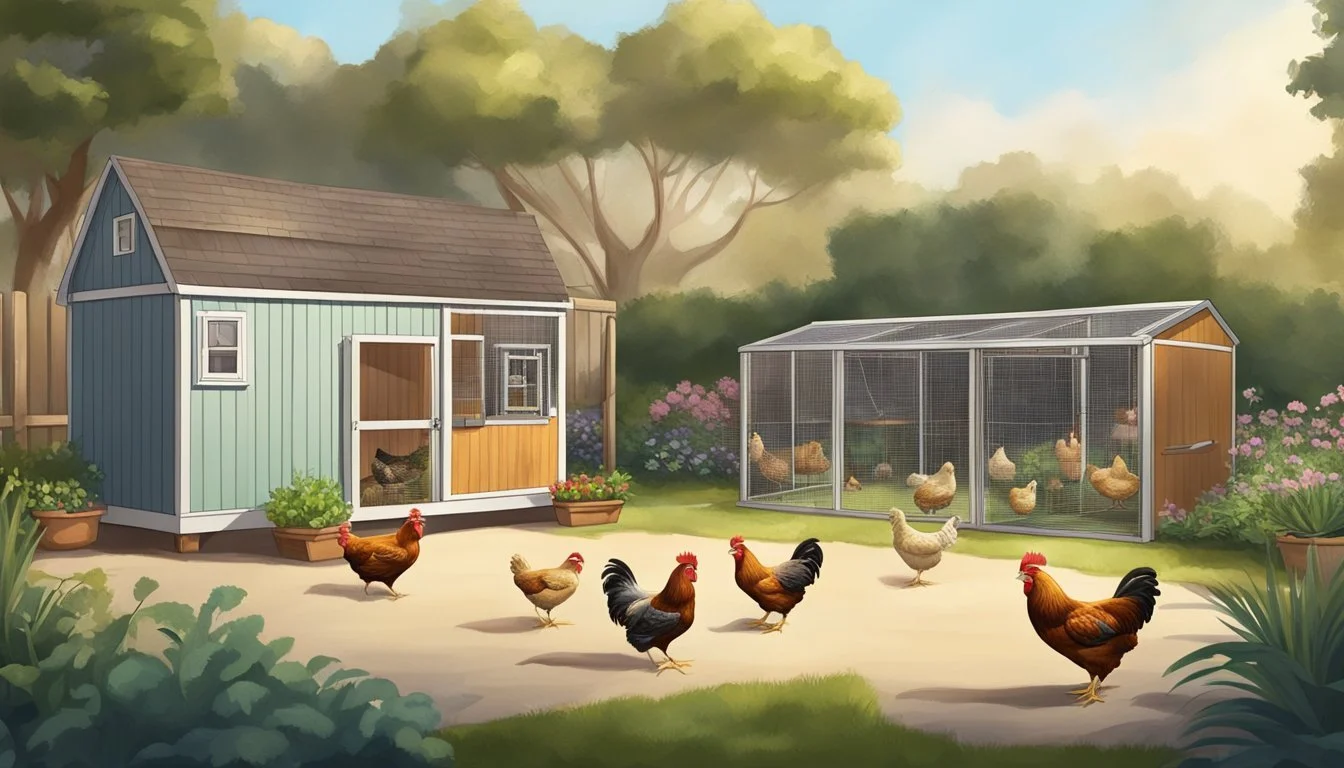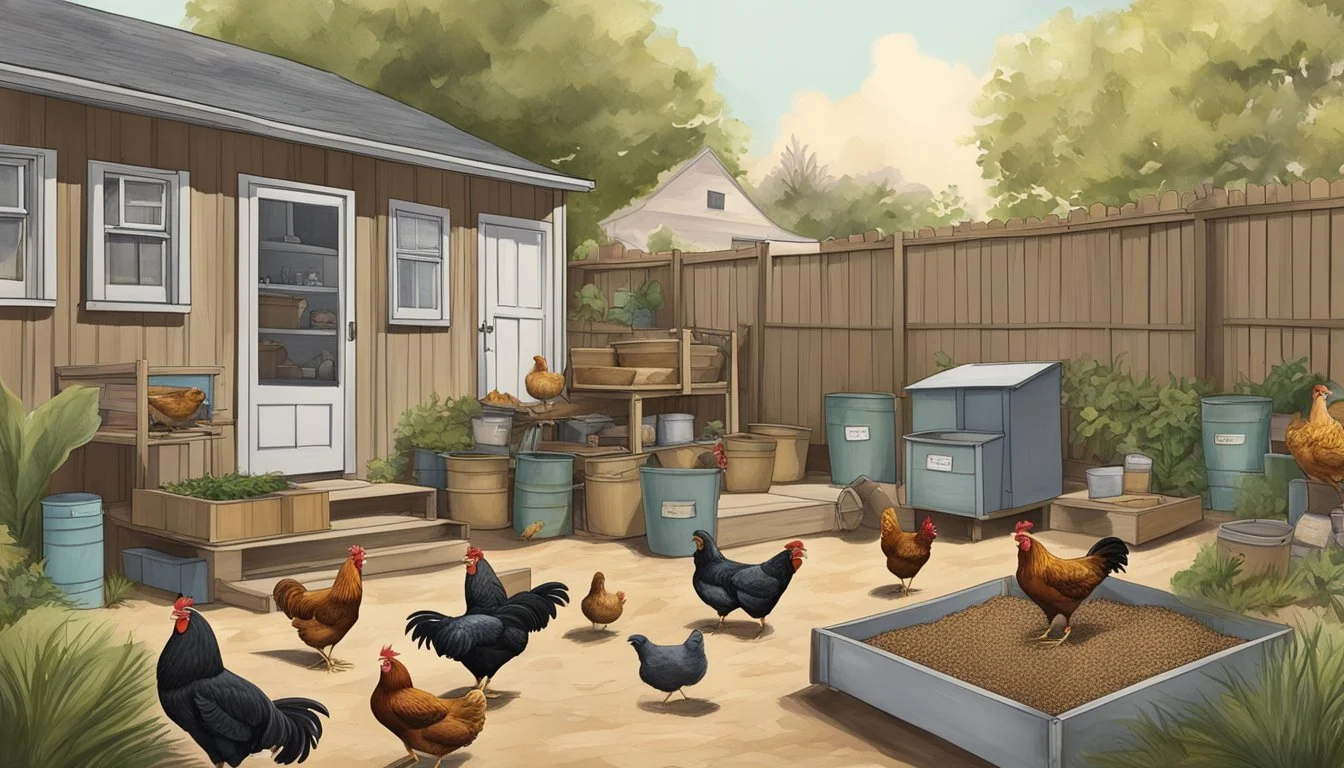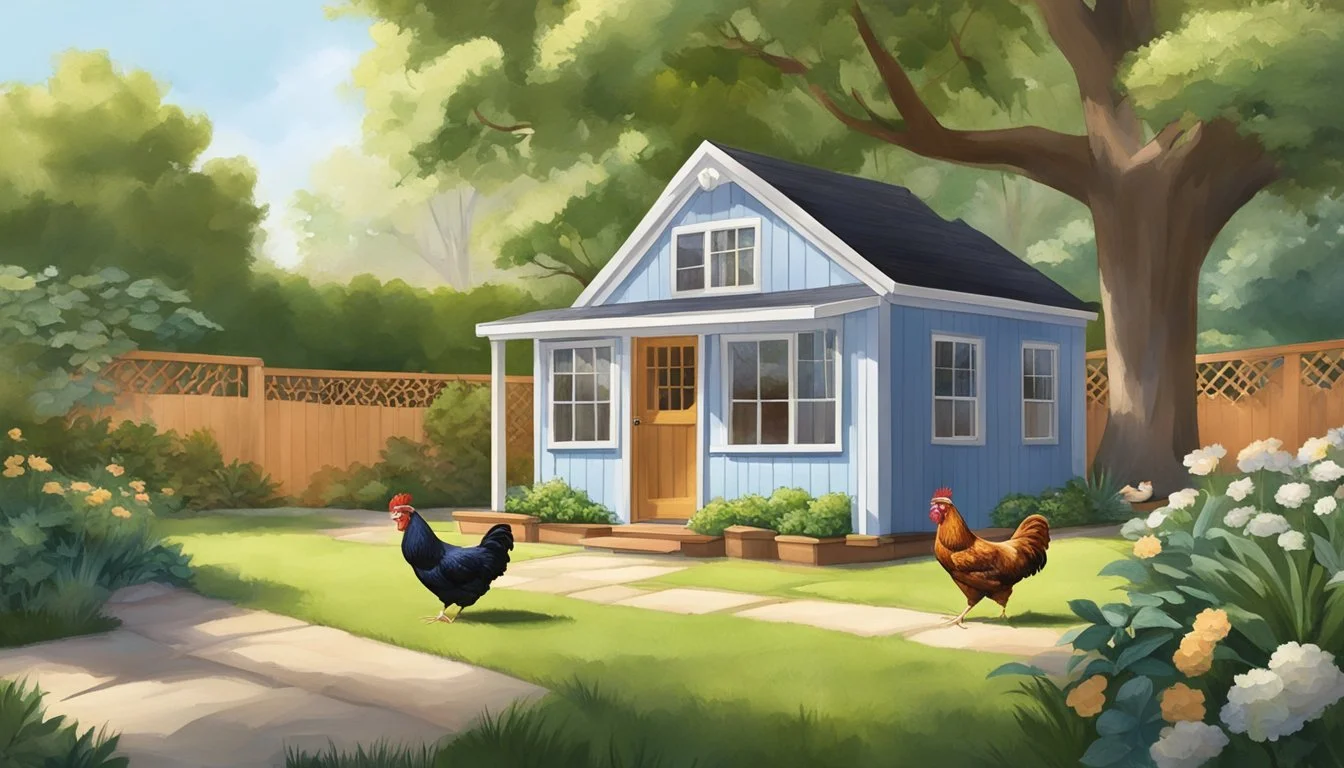Keeping Backyard Chickens in Long Beach, CA
Essential Guidelines for Urban Poultry Farming
Backyard chicken keeping has become an increasingly popular practice in urban areas, providing residents with fresh eggs, natural pest control, and the enjoyment of caring for these animals. Long Beach, California, is a city that embraces this trend, with local ordinances in place to regulate the practice of keeping chickens. These regulations are designed to balance the interests of chicken owners with those of neighbors and the wider community, ensuring that the presence of chickens contributes positively to urban life.
In Long Beach, residents are allowed to raise chickens in their backyards under specific conditions. The number of chickens permitted depends on the size of the property, and there is a cap to ensure proper space and care for the birds. While the city allows for a variable number of chickens, roosters are excluded from residential areas to prevent noise disturbances. Long Beach's approach ensures that while residents enjoy the benefits of chicken keeping, it does not interfere with the quality of life for those living nearby.
The city's regulations reflect a growing movement in California where urban agriculture and sustainability are encouraged while maintaining public health and safety standards. Chicken enthusiasts in Long Beach must be mindful of proper coop placement and adhere to guidelines that promote hygienic and humane conditions for their chickens. These measures demonstrate Long Beach's commitment to supporting urban agriculture initiatives while fostering harmonious community relations.
Understanding Local Chicken Ordinances
Keeping backyard chickens in Long Beach requires adherence to specific municipal and state regulations. It is essential to be aware of these ordinances to ensure compliance and maintain good community relations.
Long Beach City Regulations
Long Beach, California, stipulates that homeowners may raise backyard chickens under certain conditions. The city ordinances outline the following:
Chicken Allowance: Residents can keep up to 20 chickens, depending on the size of their property and zoning restrictions.
Rooster Limitations: Roosters are not permitted within city limits to prevent noise disturbances.
Coop Requirements: Chicken owners who have 11 to 20 chickens must ensure the coop is at least 50 feet away from neighboring residences.
Permits: Those with more than 10 chickens need to obtain a permit and have a pre-inspection done.
Shelter: Adequate outdoor enclosures and shelters are mandatory for the well-being of the chickens.
California State Laws
The state of California has its own set of chicken laws that work in conjunction with local regulations. While the state laws provide a framework, it's the municipality of Long Beach that has more specific ordinances affecting backyard chicken owners. Across the state, however, anyone keeping chickens must ensure:
Humane treatment and proper care of the chickens.
Adherence to health and safety regulations to prevent the spread of diseases.
When considering raising chickens in Long Beach, it’s important to consult both local and state regulations as non-compliance can lead to fines or other legal consequences.
Starting Your Backyard Flock
When setting up a backyard flock in Long Beach, CA, prospective chicken owners should consider the type of chickens to raise, adhere to the allowed number of chickens, and understand the permitting process.
Choosing the Right Chickens
One should select chicken breeds based on their adaptability to the local climate, temperament, and the purpose of rearing, such as for eggs or as pets. Researching breeds that thrive in Long Beach's environment is advised.
Number of Chickens Allowed
The City of Long Beach permits residents to keep chickens on their property, with restrictions based on lot size:
1-4 Chickens: No specific lot size requirement
5-20 Chickens: Larger lot sizes needed
It is important to note that roosters are prohibited to prevent noise disturbances.
Permitting Process
Residents must obtain a permit to keep chickens, which involves several steps:
Application: Submit a completed application to the Animal Care Services.
Fees: Pay any applicable fees required by the city.
Inspection: The coop and premises may be subject to inspection to ensure compliance with city regulations.
Keeping a backyard flock requires owners to stay informed about local laws to ensure a smooth and legal setup.
Coop Design and Placement
Proper coop design and placement are crucial for keeping chickens healthy and compliant with local regulations in Long Beach, CA.
Determining Coop Location
In Long Beach, CA, the coop location must comply with city ordinances, ensuring a suitable distance from property lines and neighboring residences to avoid nuisance. The coop should be strategically positioned away from living areas to maintain a healthy living environment for the residents. It’s essential to consider sun exposure and wind patterns to ensure that the coop receives adequate sunlight and protection from strong winds.
Building a Chicken Coop
When constructing a chicken coop, homeowners in Long Beach are limited to housing up to 20 chickens, and roosters are not permitted to minimize noise disturbances. A well-constructed chicken coop must offer:
Adequate space: At least 2 square feet per chicken for roosting space.
Predator-proofing: Secure against predators, with sturdy walls and a roof.
Ventilation: Well-ventilated to ensure fresh air without creating drafts.
Accessibility: Easy access for humans for cleaning and egg collection.
Nesting boxes: One nesting box for every 3-4 hens.
The materials and design elements chosen should ensure durability and ease of maintenance while adhering to the city's building requirements.
Coop Maintenance
Regular maintenance of a chicken coop in Long Beach is a must to keep the chickens healthy and the coop in good condition. Coop cleaning should be done frequently to prevent the build-up of droppings and reduce the risk of disease. Proper maintenance includes:
Routine inspection of structural integrity.
Periodic cleaning and disinfecting of surfaces and nesting boxes.
Ensuring the coop remains dry and well-ventilated at all times.
Implementing effective waste management systems inside the coop.
By carefully considering these factors, chicken owners in Long Beach, CA, can ensure their coops meet the needs of their fowl while respecting local regulations and neighborhood harmony.
Chicken Health and Welfare
Keeping backyard chickens healthy involves a commitment to good husbandry practices, which include disease prevention, a balanced diet, and regular veterinary care. It is vital for a flock's longevity and egg quality, as well as for the safety of both chickens and their handlers.
Preventing Diseases
Proper sanitation is the cornerstone of disease prevention in backyard poultry. Owners should regularly clean and disinfect coops and equipment to reduce the risk of Salmonella and other pathogens. They should also implement biosecurity measures, such as:
Limiting visitor contact with birds
Washing hands before and after handling chickens
Using footbaths when entering and exiting coop areas
Composting chicken waste can promote a healthy garden but must be managed to avoid attracting pests and minimizing disease transmission.
Proper Chicken Nutrition
Chickens require a balanced diet formulated for their life stage. It should consist of:
Proteins: Essential for growth and egg production
Carbohydrates: Provides energy
Fats: Supplies essential fatty acids
Vitamins and minerals: Crucial for metabolic processes
Owners can opt for commercial poultry feed, which is often nutritionally complete while supplementing with treats like mealworms and select kitchen scraps. Free-range chickens gain additional nutrients from foraging.
Regular Veterinary Care
Like all pets, chickens benefit from regular check-ups with a veterinarian. These visits can identify health issues before they become serious. Owners should be vigilant for signs of illness, such as changes in appetite or egg production, respiratory distress, or lethargy. Vaccinations may be advised depending on local disease risks.
Veterinarians can also provide guidance on parasite control, which is essential for maintaining a healthy flock.
Daily Management and Best Practices
Keeping chickens in the backyard involves consistent daily management to ensure their health and productivity. This entails regular feeding and watering, egg collection, and maintaining safety measures to protect the flock.
Feeding and Watering
Chickens require a balanced diet to lay eggs and maintain good health. It's essential to provide a mix of layer pellets, grains, and vegetables. The diet can be supplemented with kitchen scraps for variety, though one should avoid giving them onions or garlic. Clean, fresh water must be available at all times, and feed should be stored in rat-proof containers to prevent contamination and pests.
Egg Collection and Usage
Eggs should be collected at least once a day to prevent breakage and ensure cleanliness. After collection, eggs can be cleaned with fine sandpaper or a dry cloth. For personal use, it's not necessary to wash eggs until just before you're ready to use them, as this preserves the egg's natural protective coating. Eggs can be kept at room temperature for several days or refrigerated for extended freshness.
Safety Measures
Coops should be cleaned regularly to prevent disease, with a schedule for composting chicken manure to use as garden fertilizer. It's crucial to provide secure housing that protects chickens from predators. This includes a covered chicken run and locks on coop doors to deter nocturnal predators like raccoons. Regular checks for signs of wear or damage in the coop structure and surrounding fencing can prevent potential risks to the safety of the chickens.
Community Integration
Integrating backyard chickens into the Long Beach community requires consideration of neighborhood dynamics, adherence to legal frameworks, and the leveraging of educational resources to ensure harmonious existence and compliance with city ordinances.
Neighborhood Considerations
Residents interested in raising chickens must respect setback restrictions, ensuring chicken coops are at least 50 feet from neighboring homes when owning 11 to 20 chickens. Good neighbor relations are fostered by maintaining cleanliness to avoid attracting pests and by minimizing noise, with Long Beach explicitly prohibiting roosters to reduce disturbances.
Legal Compliance
Keeping chickens within Long Beach city limits necessitates a clear understanding of local ordinances. Homeowners are allowed up to 20 chickens based on property size and zoning, but they must adhere to specific guidelines, including permitting and pre-inspection requirements. Initiatives like Long Beach Grows may offer additional insights or advocate for changes through petitions, reflecting the community's evolving stance on urban agriculture.
Educational Opportunities
Engaging with community organizations provides residents with valuable knowledge about sustainable practices and proper chicken care. Resources in nearby cities such as Ontario and San Gabriel can offer additional learning experiences. Participants can explore topics ranging from coop construction to diet and health, ensuring their practice aligns with the Long Beach community's values and regulations.
Other Urban Farm Animals
While chickens are a common choice for backyard farming in Long Beach, CA, residents also explore other forms of urban agriculture such as beekeeping and rabbit raising, as well as keeping goats and other livestock for personal use, adhering to specific regulations set by the city.
Keeping Bees and Rabbits
Bees: Residents in Long Beach have the opportunity to maintain their own beehives for honey production and pollination purposes. Hive management is subject to health department standards to ensure they do not pose a nuisance or hazard.
Rabbits: Regarded equally as pets and for their utility, rabbits can be kept within the precincts of urban backyards. They must be housed in clean and secure enclosures, ensuring their well-being and preventing any potential disturbances to neighbors.
Raising Goats and Other Livestock
Goats: Individuals can raise goats in Long Beach under certain conditions that cater to the animals' needs and the community’s comfort. The goats must be provided with adequate space, shelter, and care to thrive in an urban setting.
Other Livestock: While chickens and goats are among the more common urban livestock, residents may also consider other small farm animals. Each species comes with a unique set of requirements and potential restrictions designed to integrate them into the urban environment sustainably and humanely.
Local Support and Resources
In Long Beach, residents interested in raising backyard chickens have access to a variety of community resources and commercial support services. These resources provide invaluable support to both novice and experienced chicken keepers within residential areas.
Workshops and Community Groups
Long Beach offers numerous educational opportunities for those interested in raising chickens. Community groups such as Long Beach Grows offer guidance and can connect novice chicken owners with more experienced ones. Workshops cover topics from basic care to more advanced subjects such as sustainable coop design. These groups provide a platform for community members to share knowledge and best practices for raising chickens in urban settings.
Retailers and Veterinarian Services
For supplies and professional advice, there are several local retailers that cater to poultry owners. They offer a wide range of products including feeders, waterers, coops, and nutritional supplements necessary for healthy chickens. Alongside these retailers, veterinarian services specializing in poultry are available to ensure the wellbeing of backyard chickens. These services are essential to maintain a healthy flock within the city limits of Long Beach.
Local retailers and veterinarians often understand the specific challenges and benefits of raising chickens in this urban environment, making their advice and services particularly relevant for residents of Long Beach.
Conclusion
In Long Beach, California, residents looking to participate in urban agriculture by raising backyard chickens can do so understanding city ordinances. They are permitted to house up to 20 chickens based on the size of their property, but roosters are prohibited to prevent noise complaints.
Key takeaways regarding Long Beach Chicken Ordinances include:
Chicken Allowance: Up to 20 chickens, depending on property size.
Rooster Limitation: None allowed within city limits.
Space Requirements: Adequate space and conditions are a must.
Those owning between 11 and 20 chickens must maintain a minimum distance of 50 feet from neighboring residences. This is alongside the necessity for an appropriate outdoor enclosure to provide shelter for the chickens, ensuring well-being and compliance with local regulations.
It is advised for potential and current chicken owners in Long Beach to be familiar with the local guidelines, which can be found through the Animal Care Services (ACS) Bureau. Compliance with these regulations is crucial to foster a harmonious community while indulging in the joys of raising backyard chickens.
Individuals must also obtain necessary permits and pre-inspections if owning a higher number of chickens, highlighting the city's commitment to responsible pet ownership and neighborhood harmony. Following these directives assures legal chicken raising and contributes positively to Long Beach's urban agriculture scene.











